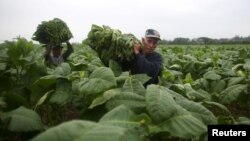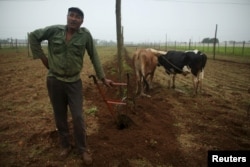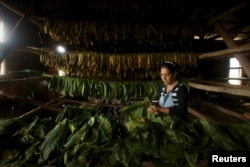Highly unusual weather has damaged Cuba's tobacco crop, raising concerns among farmers and cigar-lovers that the island's supply of its famous cigars might suffer at a time of increased demand resulting from detente with the United States.
The weather phenomena El Niño led to Cuba's worst drought in a century in 2015, followed by heavy rain during the northern winter, which is normally a dry period in Cuba.
While all Cuban crops have suffered, delicate tobacco plants are especially vulnerable. Rains have wiped out production at some plantations and severely damaged others. In response, tobacco farmers are replanting now, out of season, in hopes of salvaging the 2015-2016 harvest.
In western Pinar del Rio province, where most of Cuba's tobacco is grown, farmers are slogging through rain and mud to replant destroyed crops. The best Cuban tobacco is cultivated from late October into early January and then harvested into March.
"This has been a disaster, not just for us, but everyone," Juan Hernandez said as he steered his oxen-pulled plow through rain and a field of mud where tobacco plants once stood. "We are trying to see if we can still have a harvest."
Down the road, 60-year-old farmer Andres Chirino picked damaged leaves from plants and scowled.
"I have been growing tobacco since I was born and this is the worst harvest in my experience," he said. "Look at those stains and rot on the leaves. The quality is bad so we will earn much less."
The impact on cigar supply has yet to be determined, as tobacco normally requires at least two or three years of curing, fermenting and aging. Farmers and cigar experts say there have been several weak harvests in recent years, inconveniently occurring just as tourism in Cuba is booming.
The cigar monopoly Habanos S.A., a joint venture between the Cuban state and Imperial Tobacco Group PLC, has adequate stock to manage a dip in supply, said Carlos Ferran, an executive who was surveying western farms. Other Habanos officials referred questions to holding company Tabacuba, which did not respond to a Reuters request for comment.
David Savona, editor of Cigar Aficionado magazine, said Habanos reported three substandard harvests in a row before this year, but so far cigar quality has been maintained.
"Cuban cigars have been doing superbly in our ratings for the past several years," Savona said. "They've admittedly had some weak harvests at a time when people are thinking more and more about Cuban cigars. That can hurt you down the road."
More Soggy Weather Ahead
In the short-term, meteorologists forecast more soggy weather in February and March.
"The normal is a little rain every once in a while, but it has been raining day after day with tremendous intensity," said Ivan Rodriguez, spokesman for the famed Alejandro Robaina Tobacco Plantation.
An outlier, the Robaina plantation has been largely unaffected by the weather due to its elevated ground and resistant seeds.
Pedro Jesus Alonso, western regional director of the Agriculture Ministry's export company CATEC, insisted others could also save the harvest.
"Everything depends on a little improvement in the weather," he said. "If it does not rain too much the harvest can get back on track."









